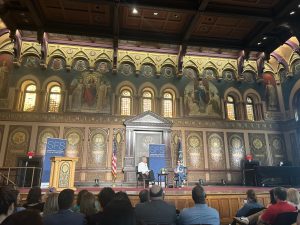Technology journalist Kara Swisher (SFS ’84) stressed the dangers of the internet and reminisced about the excitement of reporting on the rise of the internet in a conversation that Georgetown University’s School of Foreign Service (SFS) hosted March 14 in Gaston Hall.
Swisher, the editor-at-large for New York Magazine and a host of the outlet’s podcasts “On With Kara Swisher” and “Pivot,” detailed her time covering the early days of the internet — particularly AOL, the subject of her first two books — before many other journalists reported on it. Swisher said AOL’s rise to prominence drew public attention to the internet and made being a journalist at the time novel.
“Nobody was writing about this,” Swisher said at the event. “And nobody knew about AOL for sure, except when you had an outage. It was a huge moment. And I thought it was a big moment because everyone lost their minds.”
Swisher has covered the internet and the technology industry for over 30 years, having served as a contributing opinion writer for the New York Times and written for the Wall Street Journal and the Washington Post. Her third book, “Burn Book: A Tech Love Story,” came out in February.
Steve Case, a co-founder of AOL, who moderated the conversation, said Swisher’s commitment to covering technology and the internet since its early days is admirable.
“Kara was one of the first reporters to recognize the transformative power of the Internet — as a reporter in D.C. no less,” Case wrote to The Hoya. “Kara is singular in her ability to investigate power and hold the industry to task, but also recognize that critique of technology has to be balanced with the promise and hope that it will serve to keep us healthier, safer, and more connected.”
During her time at Georgetown, Swisher wrote for both The Hoya and the Georgetown Voice. She began her career for the Washington Post while still a student at Georgetown, getting the job after she criticized a Post journalist’s coverage of a Georgetown event.
Swisher said although technology can enrich communities, the amount of influence tech leaders like Elon Musk have amassed has become dangerous. She said these leaders’ companies take people’s data without thinking about the implications of their actions.
“When you realize they were the richest people in the world with unaccountable power, that’s a prescription for disaster, as you’re seeing right now with characters like Musk and others,” Swisher said.
Search engines such as Google collect audio data and many sites allow third-party apps to access data so consumers should expect that every online interaction they have with a company can be recorded in some way, according to the University of Pennsylvania. Swisher said the rise of artificial intelligence (AI) opens up a vast landscape of new innovation and regulation possibilities, such as President Joe Biden’s recent executive order on AI and other guidelines needed to ensure privacy and safety in the age of AI, for technology and the internet.
“This is supersized internet,” Swisher said. “It’s hard to describe what it’s going to do. Like, did we know when AOL started, we’d have Uber? Did we know about Amazon? No, none of this existed. And so I don’t know what the companies are going to be, but I can imagine some of them.”

“I feel like this is the opportunity to finally regulate the internet and not think it’s a dirty word,” Swisher added.
Swisher’s comments follow a recent congressional effort to pressure ByteDance, the Chinese-based and owned company that owns TikTok, to sell the company’s U.S. operations or risk facing a nationwide ban.
Swisher said she supports this legislation because the company’s Chinese ownership poses a major threat to Americans’ privacy and national security due to the Chinese government’s track record of interference in tech companies. Although the Chinese government does not have any official direct involvement with ByteDance, there is evidence the Chinese government is involved with or collects data from the company in some way.
Swisher said she thinks TikTok will ultimately be sold rather than banned due to its economic value.
“Kids, your TikTok’s not going away, FYI,” Swisher said. “It’s worth too much. None of these rich people are going to let that die. It’s whether the Chinese government, which has been involved in every Chinese company — I’m sorry, they just have — is going to be able to have this access.”
Swisher said she has recently noticed an increasing awareness of technology’s dangers and a rising movement to protect individuals’s privacy online.
“I think there’s a real movement in this country worrying about the power of tech over people’s lives and a desire to take it back from people,” Swisher said. “Parents are concerned. I think people who believe in civics are concerned, and they know what’s happening, and they know they need to hold people accountable for what these technologies are.”








